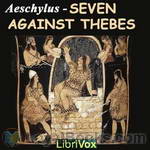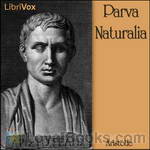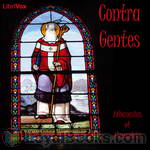|
Books Should Be Free Loyal Books Free Public Domain Audiobooks & eBook Downloads |
|
|
Books Should Be Free Loyal Books Free Public Domain Audiobooks & eBook Downloads |
|
Ancient Texts |
|---|
Book type:
Sort by:
View by:
|
By: Unknown | |
|---|---|
 The Bible, King James Version (KJV) - Introduction
The Bible, King James Version (KJV) - Introduction
Variously known as the Greatest Story Ever Told, The Book of Books and many other names, the Bible is reputed to be the biggest bestseller of all time. Translated into thousands of world languages and studied, worshiped and revered in the four corners of the earth, the Bible remains Christianity's canonical text and is considered the Word of God. The King James Version (KJV) is a translation commissioned by the Church of England in 1604 and the work continued till 1611. However, it wasn't the first translation into English from the original Hebrew, and some portions in Aramaic... | |
By: Anicius Manlius Severinus Boethius | |
|---|---|
 Consolation of Philosophy (Version 2)
Consolation of Philosophy (Version 2)
The Consolation of Philosophy was written about 524 A.D. and has been called one of the most popular and influential books ever written. The book is presented as a dialogue between Boethius, the author, and Lady Philosophy, his tutor. Through her teaching, Boethius learns the true nature of fortune, misfortune, wealth, good, and evil.This dramatic reading is an attempt to present this wonderful work in an audio format while maintaining the dialogic structure of the work. Cast ListBoethius, the Narrator: Larry WilsonPhilosophy: Devorah AllenHeadings and Footnotes: KevinS | |
By: Aristotle (384 BC - 322 BC) | |
|---|---|
 Economics
Economics
Economics (Greek: ΟΙΚΟΝΟΜΙΚΑ; Latin: Oeconomica) may not have been written by Aristotle. The author provides examples of methods used by the state to raise money including debt, currency devaluation, commodity controls, tariffs, sales tax, fines, violence and sacrilege. | |
 Eudemian Ethics
Eudemian Ethics
Eudemian Ethics (Greek: ΗΘΙΚΩΝ ΕΥΔΗΜΙΩΝ Latin: ETHICA EUDEMIA) discusses topics including virtue, friendship, happiness and God. It is believed to have been written before Nicomachean Ethics and to be named after Eudemus of Rhodes. Books IV, V, and VI of Eudemian Ethics are identical to books V, VI, and VII of Nicomachean Ethics and are excluded from this translation. | |
By: James Frazer (1854-1941) | |
|---|---|
 Golden Bough. A Study in Magic and Religion. Part 4. Adonis Attis Osiris. Volume 2
Golden Bough. A Study in Magic and Religion. Part 4. Adonis Attis Osiris. Volume 2
The sixth volume in the Golden Bough. Frazer continues into the second part of the compilation of analogies dealing with the recurring theme of the dying god. the worship of the dead, and dead kings. Extensive evidence is presented from the history of Egypt and what had been learned from archaeology in North Africa and the Mediterranean. The Egyptian calendar and festivals, the identify and personality of Osiris, and the relationship of the mother goddess, are discussed in length. - Summary by Leon Harvey | |
By: Lionel Giles (1875-1958) | |
|---|---|
 Musings of a Chinese Mystic: Selections from the Philosophy of Chuang Tzu
Musings of a Chinese Mystic: Selections from the Philosophy of Chuang Tzu
If Lao Tzu then had revolted against the growing artificiality of life in his day, a return to nature must have seemed doubly imperative to his disciple Chuang Tzu, who flourished more than a couple of centuries later, when the bugbear of civilisation had steadily advanced. With chagrin he saw that Lao Tzu's teaching had never obtained any firm hold on the masses, still less on the rulers of China, whereas the star of Confucius was unmistakably in the ascendant. Within his own recollection the propagation of Confucian ethics had received a powerful impetus from Mencius, the second of China's orthodox sages... | |
By: Plato (Πλάτων) (c. 428 BC - c. 347 BC) | |
|---|---|
 Gorgias
Gorgias
This dialogue brings Socrates face to face with the famous sophist Gorgias and his followers. It is a work likely completed around the time of "Republic" and illuminates many of the spiritual ideas of Plato. The spirituality, as Jowett points out in his wonderful introduction, has many ideas akin to Christianity, but is more generous as it reserves damnation only for the tyrants of the world. Some of the truths of Socrates, as presented by Plato, shine forth in this wonderful work on sophistry and other forms of persuasion or cookery. | |
 Lesser Hippias
Lesser Hippias
This work may not be by Plato, or his entirely, but Jowett has offered his sublime translation, and seems to lean towards including it in the canon. Socrates tempted by irony to deflate the pretentious know-it-all Hippias, an arrogant polymath, appears to follow humour more than honour in this short dialogue. | |
By: Unknown | |
|---|---|
 Mundaka Upanishad
Mundaka Upanishad
The word Upanishad (upa-ni-shad) consists of, "Upa" means "near;" "ni" means "down;" "shad" means "to sit." Thus, Upanishad is to sit down near the teacher to discuss, learn, practice, and experience. There are some 200 or more Upanishads. Some are lost and are only known about because of being referenced in other Upanishads.Most of the Upanishads were kept secret for centuries, only passed on to others orally in the form of Shloka (a category of verse line developed from the Vedic Anustubh meter)... | |
 Aitreya-Aranyaka Upanishad
Aitreya-Aranyaka Upanishad
The word Upanishad (upa-ni-shad) consists of, "Upa" means "near;" "ni" means "down;" "shad" means "to sit." Thus, Upanishad is to sit down near the teacher to discuss, learn, practice, and experience. There are some 200 or more Upanishads. Some are lost and are only known about because of being referenced in other Upanishads. Most of the Upanishads were kept secret for centuries, only passed on to others orally in the form of Shlokas (a category of verse line developed from the Vedic Anustubh meter)... | |
 Brihadaranyaka Upanishad
Brihadaranyaka Upanishad
The word Upanishad (upa-ni-shad) consists of, "Upa" means "near;" "ni" means "down;" "shad" means "to sit." Thus, Upanishad is to sit down near the teacher to discuss, learn, practice, and experience. There are some 200 or more Upanishads. Some are lost and are only known about because of being referenced in other Upanishads. Most of the Upanishads were kept secret for centuries, only passed on to others orally in the form of Shlokas (a category of verse line developed from the Vedic Anustubh meter)... | |
 Chandogya Upanishad
Chandogya Upanishad
The word Upanishad (upa-ni-shad) consists of, "Upa" means "near;" "ni" means "down;" "shad" means "to sit." Thus, Upanishad is to sit down near the teacher to discuss, learn, practice, and experience. There are some 200 or more Upanishads. Some are lost and are only known about because of being referenced in other Upanishads. The Chandogya-upanishad belongs to the Sama-veda. It ranks among the oldest Upanishads, dating to the Brahmana period of Vedic Sanskrit (before the 8th century BC). It figures as number 9 in the Muktika canon of 108 Upanishads... | |
 Prasna Upanishad
Prasna Upanishad
The word Upanishad (upa-ni-shad) consists of, "Upa" means "near;" "ni" means "down;" "shad" means "to sit." Thus, Upanishad is to sit down near the teacher to discuss, learn, practice, and experience. There are some 200 or more Upanishads. Some are lost and are only known about because of being referenced in other Upanishads. Most of the Upanishads were kept secret for centuries, only passed on to others orally in the form of Shloka (a category of verse line developed from the Vedic Anustubh meter)... | |
 Kaushitaki Upanishad
Kaushitaki Upanishad
The word Upanishad (upa-ni-shad) consists of, "Upa" means "near;" "ni" means "down;" "shad" means "to sit." Thus, Upanishad is to sit down near the teacher to discuss, learn, practice, and experience. There are some 200 or more Upanishads. Some are lost and are only known about because of being referenced in other Upanishads. Most of the Upanishads were kept secret for centuries, only passed on to others orally in the form of Shloka (a category of verse line developed from the Vedic Anustubh meter)... | |
 Isha Upanishad
Isha Upanishad
The word Upanishad (upa-ni-shad) consists of, "Upa" means "near;" "ni" means "down;" "shad" means "to sit." Thus, Upanishad is to sit down near the teacher to discuss, learn, practice, and experience. There are some 200 or more Upanishads. Some are lost and are only known about because of being referenced in other Upanishads. Most of the Upanishads were kept secret for centuries, only passed on to others orally in the form of Shloka (a category of verse line developed from the Vedic Anustubh meter)... | |
 Kena Upanishad
Kena Upanishad
The word Upanishad (upa-ni-shad) consists of, "Upa" means "near;" "ni" means "down;" "shad" means "to sit." Thus, Upanishad is to sit down near the teacher to discuss, learn, practice, and experience. There are some 200 or more Upanishads. Some are lost and are only known about because of being referenced in other Upanishads. Most of the Upanishads were kept secret for centuries, only passed on to others orally in the form of Shloka (a category of verse line developed from the Vedic Anustubh meter)... | |
 Svetasvatara Upanishad
Svetasvatara Upanishad
The word Upanishad (upa-ni-shad) consists of, "Upa" means "near;" "ni" means "down;" "shad" means "to sit." Thus, Upanishad is to sit down near the teacher to discuss, learn, practice, and experience. There are some 200 or more Upanishads. Some are lost and are only known about because of being referenced in other Upanishads. Most of the Upanishads were kept secret for centuries, only passed on to others orally in the form of Shlokas (a category of verse line developed from the Vedic Anustubh meter)... | |
 Maitrayana Upanishad
Maitrayana Upanishad
The word Upanishad (upa-ni-shad) consists of, "Upa" means "near;" "ni" means "down;" "shad" means "to sit." Thus, Upanishad is to sit down near the teacher to discuss, learn, practice, and experience. There are some 200 or more Upanishads. Some are lost and are only known about because of being referenced in other Upanishads. Most of the Upanishads were kept secret for centuries, only passed on to others orally in the form of Shlokas (a category of verse line developed from the Vedic Anustubh meter)... | |
 Taittriyaka Upanishad
Taittriyaka Upanishad
The word Upanishad (upa-ni-shad) consists of, "Upa" means "near;" "ni" means "down;" "shad" means "to sit." Thus, Upanishad is to sit down near the teacher to discuss, learn, practice, and experience. There are some 200 or more Upanishads. Some are lost and are only known about because of being referenced in other Upanishads. Most of the Upanishads were kept secret for centuries, only passed on to others orally in the form of Shloka (a category of verse line developed from the Vedic Anustubh meter)... | |
 Katha Upanishad
Katha Upanishad
The word Upanishad (upa-ni-shad) consists of, "Upa" means "near;" "ni" means "down;" "shad" means "to sit." Thus, Upanishad is to sit down near the teacher to discuss, learn, practice, and experience. There are some 200 or more Upanishads. Some are lost and are only known about because of being referenced in other Upanishads.Most of the Upanishads were kept secret for centuries, only passed on to others orally in the form of Shloka (a category of verse line developed from the Vedic Anustubh meter)... | |
By: Aeschylus (c. 525 BCE - c. 456 BCE) | |
|---|---|
 Seven Against Thebes
Seven Against Thebes
In this, the only extant tragedy from Aeschylus' trilogy about the House of Oedipus, Thebes is under siege from Polynices, a former prince of Thebes. After King Oedipus left his city and cursed the princes, Polynices and his brother, Eteocles, decided to rule alternately, switching at the end of every year. However, at the end of his year as king, Eteocles refused to turn power over to his brother and exiled him, fulfilling his father's curse that the two brothers could not rule peacefully. In the action of the play, Polynices and a group of Argive soldiers are attacking Thebes so that he can take his place as ruler... | |
By: Annie Besant (1847-1933) | |
|---|---|
 Ancient Ideals in Modern Life: Four Lectures
Ancient Ideals in Modern Life: Four Lectures
Four lectures about East Indian spirituality delivered at the twenty-fifth anniversary meeting of the Theosophical Society at Benares, 1900. - Summary by Czandra | |
By: Aristotle (384-422) | |
|---|---|
 On the Heavens
On the Heavens
On the Heavens (Greek: Περί ουρανού, Latin: De Caelo or De Caelo et Mundo) is Aristotle's chief cosmological treatise. In it Aristotle argues that the Earth is a sphere by pointing to the evidence of lunar eclipses. Aristotle also provides a detailed explanation of his theory of 'gravity' arguing that things which contain 'earth' fall towards the centre of the Universe because 'earth' is naturally attracted to the centre of the Universe. Aristotle argues that if the planet Earth was moved to the location of the Moon then objects which contain 'earth' would not fall towards the centre of the Earth but rather towards the centre of the Universe... | |
 On Generation and Corruption
On Generation and Corruption
On Generation and Corruption (Ancient Greek: Περὶ γενέσεως καὶ φθορᾶς, Latin: De Generatione et Corruptione, also known as On Coming to Be and Passing Away) is a treatise by Aristotle. Like many of his texts, it is both scientific and philosophic (although not necessarily scientific in the modern sense). The philosophy, though, is essentially empirical; as in all Aristotle's works, the deductions made about the unexperienced and unobservable are based on observations and real experiences... | |
 Parva Naturalia
Parva Naturalia
Parva Naturalia [the "short treatises on nature" (a conventional Latin title first used by Giles of Rome)] is a collection of books by Aristotle, which discuss natural phenomena involving the body and the soul. The books are as follows:I - On Sensation and the SensibleII - On Memory and RecollectionIII - On Sleeping and WakingIV - On DreamsV - On Prophecy in SleepVI - On Longevity and Shortness of LifeVII - On Youth and Old Age, Life and Death VIII - On Respiration | |
 Generation of Animals
Generation of Animals
Generation of Animals ; Latin: De Generatione Animalium) Book 1: Sexual Parts, Semen & Sexual Generation Book 2: Sexes, Embryo Development & Sterility Book 3: Birds, Fish, Cephalopods, Insects, Bees & Testacea Book 4: Causes of Sex, Heredity & Teratology Book 5: Distinction between Necessity and the Final Cause Charles Darwin wrote: "Linnaeus and Cuvier have been my two gods, though in very different ways, but they were mere schoolboys to old Aristotle." - Summary by Geoffrey Edwards | |
 Meteorology, On the Universe & On Breath
Meteorology, On the Universe & On Breath
Meteorology by Aristotle Translated by Erwin Wentworth Webster before he fell in action in 1917. Book I: The Celestial Sphere, Stars & Precipitation Book II: Seas, Winds & Earthquakes Book III: Halos, Rainbows & Mock Suns Book IV: The Elements & Secondary Qualities On the Universe is attributed to Aristotle but may have been written by Posidonius the Stoic or someone well acquainted with his work. Two candidates for the Alexander addressed in the text are Alexander the Great and Tiberius Claudius Alexander, nephew of Philo Judaeus and Procurator of Judaea, and in A... | |
 Movement & Progression of Animals
Movement & Progression of Animals
Movement of Animals begins with a discussion of the physics of motion and asks whether God, the Unmoved Mover, exists outside of our Universe. Progression of Animals asks why animals have the parts they do and to what end these parts are possessed. - Summary by Geoffrey Edwards | |
 Opuscula
Opuscula
Opuscula is a collection of shorter books that may or may not have been written by Aristotle. 1. On Colours 2. On Things Heard 3. Physiognomonics 4. On Plants 5. On Marvellous Things Heard 6. Mechanics 7. On Indivisible Lines 8. The Situations and Names of Winds 9. On Melissus, Xenophanes, and Gorgias - Summary by Geoffrey Edwards | |
 History of Animals
History of Animals
Book I Grouping of animals and the parts of the human body. Book II Different parts of red-blooded animals. Book III Internal organs. Book IV Animals without blood . Books V & VI Animal reproduction. Book VII Human reproduction. Book VIII Habits . Book IX Social behavior. Book X Dealing with barrenness in women was excluded from the translation of D'Arcy Thompson for being spurious so the translation of the Clergyman Richard Cresswell is used instead. Sir D'Arcy Wentworth Thompson was a biologist, mathematician and classicist who also wrote On Growth and Form which discusses the mathematical patterns and structures formed in plants and animals. | |
 On the Parts of Animals
On the Parts of Animals
On the Parts of Animals by Aristotle . The first book asks whether animals were designed or came into existence by chance. The remaining three books focus on particular examples of various animals and the functions of their organs. The translator William Ogle, who was both a medical doctor and classicist, presented Charles Darwin with a copy of this translation. | |
By: Athanasius of Alexandria (297-373) | |
|---|---|
 Contra Gentes
Contra Gentes
Contra Gentes is the first of a two volume work published by Athanasius of Alexandria prior to the outbreak of the Arian controversy (ca. 319). It focuses especially on pagan beliefs and worship concluding with a defense of the Christian view of God and creation -- especially creation by the eternal Word. In this way, the ground is prepared for the second volume of his work, now published separately under the title De Incarnatione Verbi. | |